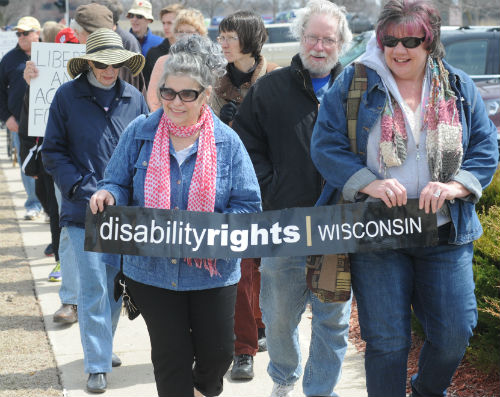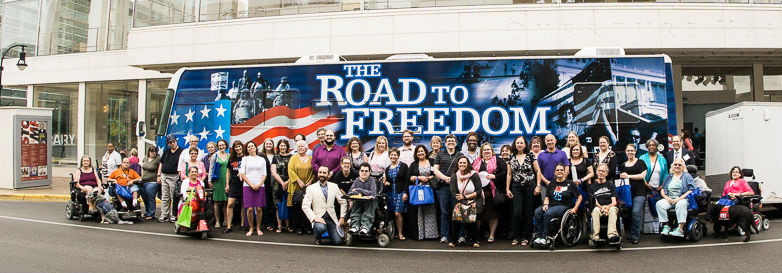In a state where elections are often decided by razor-thin margins, every vote in Wisconsin counts. Yet, for thousands of residents with severe disabilities or mental health conditions, guardianship means they lose their right to vote. As the 2024 presidential election nears, the question of who deserves to participate in democracy looms large, especially for those whose ability to cast a ballot has been quietly taken away.
Voting is one of the most fundamental rights in a democracy, but for individuals under legal guardianship, that right can be revoked. As of June 2024, nearly 6,500 Wisconsinites live under corporate guardianship, according to the Wisconsin Department of Health Services. While this number may seem small, Disability Rights Wisconsin has raised significant concerns about voting accessibility and political representation in a state where even a small number of votes can sway an election.
“To legally say that a person doesn't get to make their own choice about who they’d like to vote for is a form of disenfranchisement,” says Lisa Hassenstab, public policy manager at Disability Rights Wisconsin.
Hassenstab works as an advocate for individuals in Wisconsin whose voting rights are affected by severe disability or mental health conditions.
With the 2024 presidential election approaching, Hassenstab said there has been a growing number of legal proceedings involving voters with disabilities in Wisconsin. She cited a case in early September when Ron Heuer, leader of the Wisconsin Voters Alliance, petitioned the Wisconsin Supreme Court to gain public access to guardianship paperwork to view the names of individuals who have lost their voting rights.
Heuer is known to publish conspiracy theories regarding voter fraud during the 2020 election. The court has yet to rule on the case. Hassenstab said these legal actions have further motivated Disability Rights Wisconsin to push for legislative changes for those under guardianship.
“Last session, there was a lot of legislation around voting. Most of it was things that we opposed, so we played a lot of defense,” she said.
“One of the issues was voters in residential facilities or under guardianship being questioned about their right to vote. I suspect that it will come up again in the new session. There was some pretty inflammatory rhetoric in the spring around voters with disabilities.”
Low Standards, High Stakes: Guardianship and Voting Rights
In Wisconsin, the legal standards for placing someone under guardianship are considered low, according to Jake Joling, a civil attorney at Murphy Desmond.
“Most commonly, it'll be parents who have a child with some sort of learning disability … there are also the folks that are more senior in age or maybe have dementia,” Joling said. “In some of the most severe cases, it's to the point where the person genuinely does not recognize who they're talking to or has no concept of where they are [or] what's going on.”
Individuals under guardianship can either completely lose their rights or have limited control over their decisions.
“There's a laundry list of rights that you can choose to keep or lose,” Joling said. “Generally speaking, you'll lose all of them. When I represent the petitioner, I take a wholesale approach, asking for all rights of the ward to be stripped.”
This broad removal of rights often includes the right to vote, which can be taken away without careful consideration of the individual's capacity to make informed decisions, Joling said.
Robin Gray, court-ordered evaluations program coordinator at Wisconsin Research, Innovation, and Scholarly Excellence (RISE), which works in Dane County on guardianship cases, said, “Every one of those boxes is weighed every single time because every person is an individual with different needs, different circumstances. At RISE, we never take it lightly when we're talking about someone's rights.”
Hassenstab believes there needs to be more awareness and education about guardianship cases, both from an individual and legal standpoint.
“It’s something that for a lot of folks, including sometimes the judge, isn’t paid attention to much,” Hassenstab said. “It’s really just a tiny checkbox. We’ve seen some cases where they’ll go through and just check the boxes without fully understanding what it means.”
Because of the “wholesale” approach and lack of understanding about guardianship, many individuals placed under guardianship unknowingly lose their right to vote.
“People aren’t always aware whether they’ve retained the right to vote or not. We get a fair amount of calls to our voter hotline from individuals under guardianship or their guardians after they realize they’ve lost the right to vote and want to get it restored,” Hassenstab said.
Joling sees places for change within the legal system. “I don't know that the law is all that clear, at least to a person who doesn't deal with it very frequently. Some things that could change is not necessarily taking the wholesale approach but instead taking it more case by case rather than using the default of, well, we're just going to take away everything.”
The Role of Psychological Testing in Guardianship Cases
In guardianship cases, individuals with severe disabilities or mental health conditions must undergo a court-ordered psychological assessment. These assessments are often a key factor in deciding a person's legal rights, including the right to vote.
Hassenstab believes the use of assessments is unfair. “It’s a test, and we’re not supposed to have tests for people to access their right to vote. It’s not something we ask of any other voter.”
Terry McLaren, a RISE psychologist specializing in court-ordered evaluations, said the cognitive assessments explore areas such as memory, problem-solving, and pattern recognition.
These psychological assessments do not directly assess someone’s ability to vote in state or national elections, which Hassenstab sees as a significant issue.
“The [process] is a little wonky … There's no clear measuring stick of whether somebody retains the right to vote or not. There's no specific question that you're supposed to ask somebody to figure out if they understand this or not. It's very subjective,” Hassenstab said.
“Voting or politics isn’t something that is part of mental status exams … I don't specifically bring up voting, but it can come up spontaneously in conversation,” McLaren said.
Gray mentions the difficulties that arise when legal expertise conflicts with psychological assessments.
“One of the challenges, when we're talking about someone's competency to make decisions, is when the defense attorney tries to fight against what we as social workers and psychologists say is not in their client’s best interest. In fact, it can be really dangerous for the client or other people,” she said.
Still, for some individuals under guardianship, politics remain central to their lives. “There was one woman at an assisted living facility, and her caregiver told me when Joe Biden won the election in 2020, this woman got up out of bed and danced,” McLaren recalled.
Guardianship and Possible Outcomes of the 2024 Election in Wisconsin
As Wisconsin heads into the critical 2024 election, the debate over guardianship and voting rights highlights the complex and often overlooked issue of disenfranchisement for individuals with severe disabilities or mental health conditions. While the number of voters affected may not be large enough to change the outcome, the voices of these individuals are undeniably absent.
“I don’t think the number [of affected potential voters] will be large enough to swing an election one way or the other,” Joling said, “but those individuals should be politically represented in some capacity.”
McLaren emphasizes the fundamental right to vote, regardless of a person’s abilities, “If you have a pulse and you're an American citizen, you have the right to vote, in essence. The standard should be whether you participate or not, that is your right; whether you're educated or not, that's your right. It is disenfranchising for those who meet those characteristics but still can’t participate due to being under guardianship.”
Advocates like Hassenstab continue to push for reforms to ensure that no eligible voter is unfairly silenced due to legal guardianship.
“I always am an advocate for every vote counts—we're really in one of those situations here in Wisconsin. It is frustrating to know that there are people that very likely should have retained the right to vote and did not and who are not going to be able to cast their ballot.”


